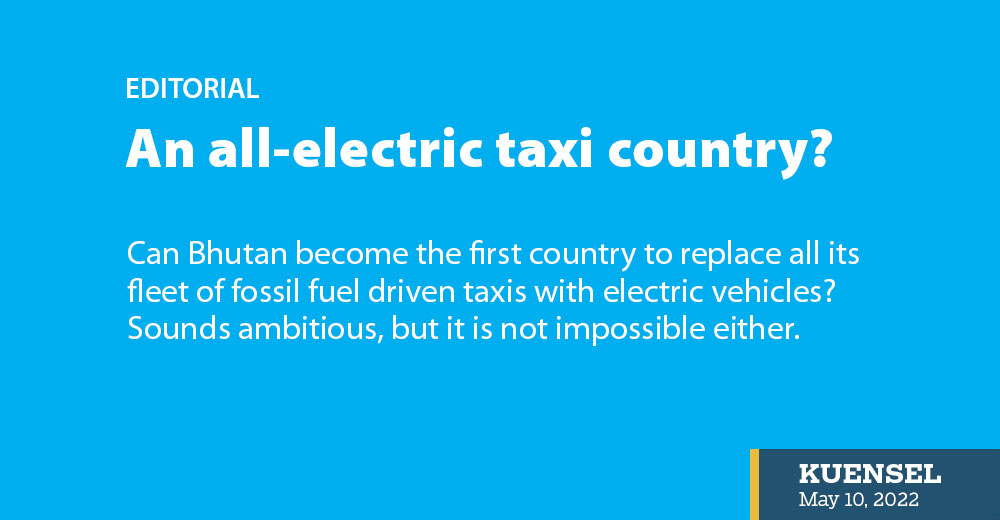Can Bhutan become the first country to replace all its fleet of fossil fuel driven taxis with electric vehicles? Sounds ambitious, but it is not impossible either.
There are only about 6,000 taxis in the country. We have already replaced 129 out of the total. More are on the way under the Bhutan Sustainable Low Emission Urban Transport Systems project that aims to replace 300 more. There is a subsidy and taxi drivers need not take huge loans or pay much in upfront payments.
Above all, the cost of soaring fuel, both petrol and diesel, is making many rethink. Fuel prices have suddenly sky-rocketed. Words going around is that it will further increase by 50 Chhetrums every fortnight. In other words, the cost of transportation will burn deeper in our pockets.
Going electric is a good option. Taxi drivers who switched to electric vehicles are having the last laugh today with the rest of their friends complaining about fuel price. Some wait around and at taxi stands to save fuel, as their colleagues drive by with a wry smile in a brand new EV taxi. The quality of EVs are improving and the government is installing charging stations across the country.
There is pressure to reduce the dependence on fossil fuel as global warming and climate change become the agenda for 21st century development discourse. Conflicts around the world – political or economic are making fossil fuel more expensive. Even by a layman’s estimate, it will be years before we can stabilise the global fuel price.
Our advantage is that we are rich in clean energy- hydroelectricity. Using it to drive public transportation has multiple benefits. As a champion of environment conservation, it will help us in maintaining our status as a carbon neutral country. It could or should bring down the cost of public transportation.
The project to replace taxis with EVs had seen high speed bumps along the way. It is becoming a reality making skeptics rue for not being a part. Recognising the uncertainties surrounding fossil fuel price and the certainty of cheap renewable energy the country is rich for, we should extend the project to other areas. Why not EV buses in all the thromdes? Why not replace the fleet of pool vehicles with EVs? Why not extend the subsidy to private individuals wanting to go electric?
There are opportunities to make it happen. The war in Europe, the crisis in the region is a good example to teach us a lesson. If we learn, we will be wiser. If not, we will regret letting a crisis go to waste.
As a landlocked country, we are dependent on land transport. It is expensive and determined by factors that are not in our hands. What about an electric train line from Pasakha in Phuenstholing to Thimphu or Paro or from Samdrup Jongkhar to Trashigang. It may sound strange, but these are the possibilities if we have the will and the resources. Our development partners could be happy to support such initiatives. There are some. We could have more.


